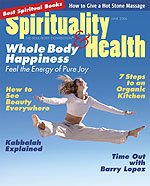CARE of the SOUL
Let me paraphrase the first words I ever read by Marsilio Ficino, spokesperson for soul in fifteenth-century Italy. He begins his book on natural magic saying, "There are three things in the world: body, soul, and mind [later he refers to mind and spirit interchangeably]. If the spirit is left to itself, it will have no connection with the body. If the body is left to itself, it will have no tie to the spirit. What is needed is soul, between them and adjusted to each."
We have a good picture of the deep soul from the works of C. G. Jung, James Hillman, and others. It is the very depth of a person: the emotions and ties, the failures and fears, a sense of home and body, all intimate connections, dreams, loves, and reveries. Tradition says that this deep soul makes us human and unique. The soul is embedded in our everyday, ordinary, imperfect concrete world.
The spirit, in contrast, gives us cosmic vision, inspiration, principles for good living, a way to deal with our mortality, and the sense of unbounded transcendence. Both soul and spirit are essential and animate the body. I often explain it this way: In the presence of a highly spiritual or intellectual person, you are amazed and instructed. In the case of a person with soul, you'd like to go to dinner with him.
I frequently find that the medical people I work with have not come to grips with death. Their education and the ethos of their profession keep them focused on the technical aspects of their work. Many find it difficult to converse with their patients, and some feel quite superior on account of their knowledge. In other words, their work is lacking in soul. When I suggest some reading or classes in matters of soul and spirit, I'm always told that there just isn't enough time. "Five minutes!" I said recently to a faculty member. "We don't have three," he said. Busyness seems to be a special neurosis of the profession in its modern form.
But many of us know physicians who have severed themselves from the burden of modernism and can give their patients adequate time and full attention.
What is needed is an escape from the bubble of modernism. Medicine is devoted to evidence and proof. Medical theorists come loaded down with research findings, which they use to establish a sense of certainty in a realm teeming with mysteries.
I ask the doctors: What image of the person will I find in your consulting room? A skeleton? That's not who I am. A plastic model of intestines? That's not me, either. I'd like to see a person in animated relationship to someone else in a particular place in the world. That's what a whole person is. And when whole persons get sick, their whole being, including their families and friends, and probably their houses, participate in the illness.
Spirituality gives the soul its vision and the soul gives our lives emotional, intellectual, and even physical vitality. If medicine would address us as whole persons, having important relationships, living, and working in a particular place, with our dreams and fears and concerns, we might be able to heal from the inside out.
Thomas Moore's latest book is Dark Nights of the Soul: A Guide to Finding Your Way Through Life's Ordeals. He is the author of Care of the Soul .
THOMAS MOORE is a psychotherapist, writer and lecturer who lives in New England with his wife and two children. He has published many articles in the areas of archetypal and Jungian psychology, mythology, and the arts.




